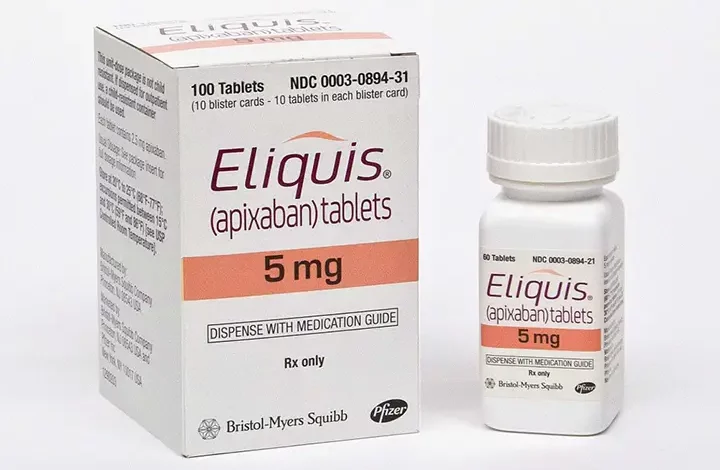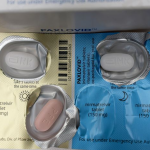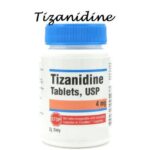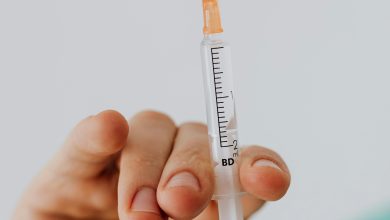List Of Drugs That Interact With Eliquis

Eliquis is the brand name for the medication apixaban. It belongs to a class of drugs called anticoagulants, or blood thinners. Eliquis is commonly prescribed to reduce the risk of stroke and blood clots in people with certain medical conditions, particularly those with atrial fibrillation (a heart rhythm disorder) and deep vein thrombosis (DVT) or pulmonary embolism (PE).
Apixaban works by inhibiting specific clotting factors in the blood, thereby preventing the formation of blood clots. This helps to reduce the risk of strokes caused by blood clots that may form in the heart in individuals with atrial fibrillation. It also helps prevent the occurrence of DVT and PE by inhibiting the clotting process in the veins.
Since its approval, Eliquis has gained popularity and has become widely prescribed for various indications related to blood clot prevention. It is considered one of the leading oral anticoagulants due to its efficacy, safety profile, and ease of use. The drug is typically taken twice daily in fixed doses, eliminating the need for regular monitoring of blood coagulation levels, which is required with older anticoagulants like warfarin.
However like any medication, it is essential to be aware of potential drug interactions to ensure the safe and effective use of Eliquis. This article aims to shed light on the key considerations regarding Eliquis interactions.
Understanding Drug Interactions
When taking Eliquis, it’s crucial to be mindful of other medications, supplements, or substances that may interact with it. Drug interactions can affect the efficacy of Eliquis, increase the risk of bleeding, or impact the metabolism of the interacting drugs. It is important to inform your healthcare provider about all the medications you are taking, including prescription drugs, over-the-counter medications, herbal supplements, and recreational substances.
List Of Drugs That Interact With Eliquis
Several drugs can interact with the way Eliquis, here are 25 common medications that can interact with Eliquis:
1. Warfarin: Warfarin is another anticoagulant, and combining it with Eliquis can increase the risk of bleeding. The combination requires close monitoring and dosage adjustments to maintain the desired anticoagulant effect.
2. Heparin: Heparin is also an anticoagulant, often used in hospital settings. Concurrent use of Eliquis and heparin can increase the risk of bleeding. Your healthcare provider will closely monitor your condition and adjust dosages accordingly.
3. Aspirin: Aspirin is an antiplatelet medication commonly used for its blood-thinning effects. Combining aspirin with Eliquis can increase the risk of bleeding. The decision to use both medications together should be made by your healthcare provider based on your specific medical condition.
4. Clopidogrel: Clopidogrel is another antiplatelet medication used to prevent blood clots. Combining Eliquis with clopidogrel may increase the risk of bleeding, and careful monitoring is required.
5. Nonsteroidal Anti-Inflammatory Drugs (NSAIDs): NSAIDs like ibuprofen and naproxen can increase the risk of bleeding when taken with Eliquis. These medications are commonly used for pain relief, so it’s essential to discuss alternative pain management options with your healthcare provider.
6. Dabigatran: Dabigatran is another oral anticoagulant similar to Eliquis. Combining these two medications can significantly increase the risk of bleeding and requires careful monitoring and dosage adjustments.
7. Rivaroxaban: Rivaroxaban is another anticoagulant used to prevent blood clots. Taking Eliquis and rivaroxaban together may increase the risk of bleeding complications, and the combination should be avoided.
8. Enoxaparin: Enoxaparin is a type of heparin used to prevent and treat blood clots. Concurrent use of Eliquis and enoxaparin can increase the risk of bleeding and requires close monitoring.
9. Ticagrelor: Ticagrelor is an antiplatelet medication used to prevent heart attacks and strokes. Combining Eliquis with ticagrelor can increase the risk of bleeding, and the decision to use both medications together should be made by your healthcare provider.
10. Citalopram: Citalopram is an antidepressant that belongs to the class of selective serotonin reuptake inhibitors (SSRIs). Combining citalopram with Eliquis may increase the risk of bleeding, so caution is advised.
11. Fluoxetine: Fluoxetine is another SSRI antidepressant. Like citalopram, combining fluoxetine with Eliquis can increase the risk of bleeding.
12. Paroxetine: Paroxetine is an SSRI antidepressant that can interact with Eliquis, leading to an increased risk of bleeding. Close monitoring is necessary if these medications are used together.
13. Venlafaxine: Venlafaxine is a serotonin-norepinephrine reuptake inhibitor (SNRI) used to treat depression and anxiety disorders. Taking Eliquis with venlafaxine can increase the risk of bleeding and should be monitored closely by a healthcare provider.
14. Diltiazem: Diltiazem is a medication used to treat high blood pressure and certain heart conditions. Combining Eliquis with diltiazem can increase the concentration of Eliquis in the body, potentially leading to an increased risk of bleeding. Dose adjustments may be necessary.
15. Verapamil: Verapamil, like diltiazem, is used to treat high blood pressure and heart conditions. It can interact with Eliquis, increasing the concentration of Eliquis in the body and the risk of bleeding.
16. Amiodarone: Amiodarone is an antiarrhythmic medication used to treat irregular heart rhythms. When combined with Eliquis, it can increase the concentration of Eliquis in the body, leading to an increased risk of bleeding. Regular monitoring is essential.
17. Carbamazepine: Carbamazepine is an anticonvulsant and mood stabilizer used to treat epilepsy and certain psychiatric conditions. It can accelerate the breakdown of Eliquis in the body, potentially reducing its effectiveness. Dose adjustments may be necessary.
18. Rifampin: Rifampin is an antibiotic used to treat various bacterial infections. It can increase the metabolism of Eliquis, reducing its concentration and potentially compromising its anticoagulant effect. Close monitoring is required.
19. St. John’s wort: St. John’s wort is an herbal supplement used for depression and other conditions. It can interact with Eliquis by increasing its metabolism, potentially reducing its effectiveness. It should be avoided or used with caution.
20. Ketoconazole: Ketoconazole is an antifungal medication. It can inhibit the metabolism of Eliquis, leading to an increased concentration of Eliquis in the body and an elevated risk of bleeding. Close monitoring is necessary.
21. Clarithromycin: Clarithromycin is an antibiotic commonly used to treat bacterial infections. It can inhibit the metabolism of Eliquis, potentially increasing its concentration and the risk of bleeding. Regular monitoring is advised.
22. Erythromycin: Erythromycin is another antibiotic that can interact with Eliquis. Similar to clarithromycin, it can inhibit Eliquis metabolism and increase its concentration, potentially leading toan increased risk of bleeding.
23. Grapefruit juice: Grapefruit juice can inhibit an enzyme in the body responsible for metabolizing Eliquis, resulting in increased drug concentration. This interaction can increase the risk of bleeding, so it is generally recommended to avoid grapefruit juice while taking Eliquis.
24. Pantoprazole: Pantoprazole is a proton pump inhibitor (PPI) used to treat conditions such as gastroesophageal reflux disease (GERD). It is generally safe to use with Eliquis, but it may slightly decrease the absorption of Eliquis, so it is recommended to take them at different times of the day.
25. Omeprazole: Omeprazole is another PPI that can be used with Eliquis. It may have a similar effect as pantoprazole, potentially reducing the absorption of Eliquis. Taking them at different times of the day is advisable.
Remember, this is not an exhaustive list, and there may be other medications, supplements, or substances that can interact with Eliquis. Always consult your healthcare provider or pharmacist for personalized advice and to ensure the safe and effective use of Eliquis. They will have access to your complete medical history and can provide tailored recommendations based on your specific situation.
How To Reduce The Risk Of Eliquis Interactions
Reducing the risk of Eliquis interactions requires proactive steps and open communication with your healthcare provider. Here are some strategies to minimize the risk:
1. Provide a complete medication list: Make sure to inform your healthcare provider about all the medications you are currently taking, including prescription drugs, over-the-counter medications, herbal supplements, and recreational substances. This comprehensive list will help your healthcare provider assess potential interactions and make informed decisions about your treatment plan.
2. Consult with your healthcare provider: Before starting any new medication or supplement while taking Eliquis, consult with your healthcare provider or pharmacist. They can review the potential interactions and advise you on the best course of action. This step is crucial, especially when it comes to medications known to interact with Eliquis.
3. Follow dosage instructions: Take Eliquis exactly as prescribed by your healthcare provider. Avoid altering the dosage or frequency without their guidance. Taking the correct dose at the recommended times can help maintain therapeutic levels while minimizing the risk of interactions.
4. Inform other healthcare providers: If you are seeing multiple healthcare providers, ensure that each one is aware of all the medications you are taking, including Eliquis. This includes specialists, dentists, and any other healthcare professionals involved in your care. Open communication among your healthcare team is essential to avoid potential interactions.
5. Educate yourself: Take the time to learn about Eliquis and its potential interactions. Read the medication guide provided by your pharmacist and familiarize yourself with the known interactions. This knowledge will help you make informed decisions and ask appropriate questions during your healthcare provider visits.
6. Be cautious with over-the-counter medications: Some over-the-counter medications, such as NSAIDs and certain cold and flu remedies, can interact with Eliquis. Read labels carefully and consult with your healthcare provider or pharmacist before taking any over-the-counter medications while on Eliquis.
7. Avoid self-medication: Do not start or stop any medication, including supplements, without consulting your healthcare provider first. Even seemingly harmless supplements or herbal remedies can have interactions with Eliquis. Your healthcare provider can provide guidance on which supplements are safe to use while taking Eliquis.
8. Regularly review your medication regimen: Periodically review your medication regimen with your healthcare provider to assess its ongoing appropriateness. Changes in your health status or the addition of new medications may necessitate adjustments to minimize the risk of interactions.
Remember, these strategies are general recommendations, and it is crucial to consult with your healthcare provider for personalized advice based on your specific medical condition and medication regimen.
Conclusion
Eliquis is an effective anticoagulant medication that plays a vital role in preventing strokes, systemic embolism, and treating venous thromboembolism. Understanding potential drug interactions is crucial to ensure its safe and effective use. Always consult your healthcare provider and inform them about all medications and substances you are taking to minimize the risk of adverse interactions. By working closely with your healthcare team, you can maximize the benefits of Eliquis while minimizing potential risks.
List Of Drugs That Interact With Eliquis
Eliquis is the brand name for the medication apixaban. It belongs to a class of drugs called anticoagulants, or blood thinners. Eliquis is commonly prescribed to reduce the risk of stroke and blood clots in people with certain medical conditions, particularly those with atrial fibrillation (a heart rhythm disorder) and deep vein thrombosis (DVT) or pulmonary embolism (PE).
Apixaban works by inhibiting specific clotting factors in the blood, thereby preventing the formation of blood clots. This helps to reduce the risk of strokes caused by blood clots that may form in the heart in individuals with atrial fibrillation. It also helps prevent the occurrence of DVT and PE by inhibiting the clotting process in the veins.
Since its approval, Eliquis has gained popularity and has become widely prescribed for various indications related to blood clot prevention. It is considered one of the leading oral anticoagulants due to its efficacy, safety profile, and ease of use. The drug is typically taken twice daily in fixed doses, eliminating the need for regular monitoring of blood coagulation levels, which is required with older anticoagulants like warfarin.
However like any medication, it is essential to be aware of potential drug interactions to ensure the safe and effective use of Eliquis. This article aims to shed light on the key considerations regarding Eliquis interactions.
Understanding Drug Interactions
When taking Eliquis, it’s crucial to be mindful of other medications, supplements, or substances that may interact with it. Drug interactions can affect the efficacy of Eliquis, increase the risk of bleeding, or impact the metabolism of the interacting drugs. It is important to inform your healthcare provider about all the medications you are taking, including prescription drugs, over-the-counter medications, herbal supplements, and recreational substances.
List Of Drugs That Interact With Eliquis
Several drugs can interact with the way Eliquis, here are 25 common medications that can interact with Eliquis:
1. Warfarin: Warfarin is another anticoagulant, and combining it with Eliquis can increase the risk of bleeding. The combination requires close monitoring and dosage adjustments to maintain the desired anticoagulant effect.
2. Heparin: Heparin is also an anticoagulant, often used in hospital settings. Concurrent use of Eliquis and heparin can increase the risk of bleeding. Your healthcare provider will closely monitor your condition and adjust dosages accordingly.
3. Aspirin: Aspirin is an antiplatelet medication commonly used for its blood-thinning effects. Combining aspirin with Eliquis can increase the risk of bleeding. The decision to use both medications together should be made by your healthcare provider based on your specific medical condition.
4. Clopidogrel: Clopidogrel is another antiplatelet medication used to prevent blood clots. Combining Eliquis with clopidogrel may increase the risk of bleeding, and careful monitoring is required.
5. Nonsteroidal Anti-Inflammatory Drugs (NSAIDs): NSAIDs like ibuprofen and naproxen can increase the risk of bleeding when taken with Eliquis. These medications are commonly used for pain relief, so it’s essential to discuss alternative pain management options with your healthcare provider.
6. Dabigatran: Dabigatran is another oral anticoagulant similar to Eliquis. Combining these two medications can significantly increase the risk of bleeding and requires careful monitoring and dosage adjustments.
7. Rivaroxaban: Rivaroxaban is another anticoagulant used to prevent blood clots. Taking Eliquis and rivaroxaban together may increase the risk of bleeding complications, and the combination should be avoided.
8. Enoxaparin: Enoxaparin is a type of heparin used to prevent and treat blood clots. Concurrent use of Eliquis and enoxaparin can increase the risk of bleeding and requires close monitoring.
9. Ticagrelor: Ticagrelor is an antiplatelet medication used to prevent heart attacks and strokes. Combining Eliquis with ticagrelor can increase the risk of bleeding, and the decision to use both medications together should be made by your healthcare provider.
It is important to note that this is just a partial list, and there are additional medications that can interact with Eliquis. Always consult your healthcare provider or pharmacist for a comprehensive assessment of your medication regimen and potential interactions before starting or stopping any medications.
10. Citalopram: Citalopram is an antidepressant that belongs to the class of selective serotonin reuptake inhibitors (SSRIs). Combining citalopram with Eliquis may increase the risk of bleeding, so caution is advised.
11. Fluoxetine: Fluoxetine is another SSRI antidepressant. Like citalopram, combining fluoxetine with Eliquis can increase the risk of bleeding.
12. Paroxetine: Paroxetine is an SSRI antidepressant that can interact with Eliquis, leading to an increased risk of bleeding. Close monitoring is necessary if these medications are used together.
13. Venlafaxine: Venlafaxine is a serotonin-norepinephrine reuptake inhibitor (SNRI) used to treat depression and anxiety disorders. Taking Eliquis with venlafaxine can increase the risk of bleeding and should be monitored closely by a healthcare provider.
14. Diltiazem: Diltiazem is a medication used to treat high blood pressure and certain heart conditions. Combining Eliquis with diltiazem can increase the concentration of Eliquis in the body, potentially leading to an increased risk of bleeding. Dose adjustments may be necessary.
15. Verapamil: Verapamil, like diltiazem, is used to treat high blood pressure and heart conditions. It can interact with Eliquis, increasing the concentration of Eliquis in the body and the risk of bleeding.
16. Amiodarone: Amiodarone is an antiarrhythmic medication used to treat irregular heart rhythms. When combined with Eliquis, it can increase the concentration of Eliquis in the body, leading to an increased risk of bleeding. Regular monitoring is essential.
17. Carbamazepine: Carbamazepine is an anticonvulsant and mood stabilizer used to treat epilepsy and certain psychiatric conditions. It can accelerate the breakdown of Eliquis in the body, potentially reducing its effectiveness. Dose adjustments may be necessary.
18. Rifampin: Rifampin is an antibiotic used to treat various bacterial infections. It can increase the metabolism of Eliquis, reducing its concentration and potentially compromising its anticoagulant effect. Close monitoring is required.
19. St. John’s wort: St. John’s wort is an herbal supplement used for depression and other conditions. It can interact with Eliquis by increasing its metabolism, potentially reducing its effectiveness. It should be avoided or used with caution.
20. Ketoconazole: Ketoconazole is an antifungal medication. It can inhibit the metabolism of Eliquis, leading to an increased concentration of Eliquis in the body and an elevated risk of bleeding. Close monitoring is necessary.
21. Clarithromycin: Clarithromycin is an antibiotic commonly used to treat bacterial infections. It can inhibit the metabolism of Eliquis, potentially increasing its concentration and the risk of bleeding. Regular monitoring is advised.
22. Erythromycin: Erythromycin is another antibiotic that can interact with Eliquis. Similar to clarithromycin, it can inhibit Eliquis metabolism and increase its concentration, potentially leading toan increased risk of bleeding.
23. Grapefruit juice: Grapefruit juice can inhibit an enzyme in the body responsible for metabolizing Eliquis, resulting in increased drug concentration. This interaction can increase the risk of bleeding, so it is generally recommended to avoid grapefruit juice while taking Eliquis.
24. Pantoprazole: Pantoprazole is a proton pump inhibitor (PPI) used to treat conditions such as gastroesophageal reflux disease (GERD). It is generally safe to use with Eliquis, but it may slightly decrease the absorption of Eliquis, so it is recommended to take them at different times of the day.
25. Omeprazole: Omeprazole is another PPI that can be used with Eliquis. It may have a similar effect as pantoprazole, potentially reducing the absorption of Eliquis. Taking them at different times of the day is advisable.
Remember, this is not an exhaustive list, and there may be other medications, supplements, or substances that can interact with Eliquis. Always consult your healthcare provider or pharmacist for personalized advice and to ensure the safe and effective use of Eliquis. They will have access to your complete medical history and can provide tailored recommendations based on your specific situation.
How To Reduce The Risk Of Eliquis Interactions
Reducing the risk of Eliquis interactions requires proactive steps and open communication with your healthcare provider. Here are some strategies to minimize the risk:
1. Provide a complete medication list: Make sure to inform your healthcare provider about all the medications you are currently taking, including prescription drugs, over-the-counter medications, herbal supplements, and recreational substances. This comprehensive list will help your healthcare provider assess potential interactions and make informed decisions about your treatment plan.
2. Consult with your healthcare provider: Before starting any new medication or supplement while taking Eliquis, consult with your healthcare provider or pharmacist. They can review the potential interactions and advise you on the best course of action. This step is crucial, especially when it comes to medications known to interact with Eliquis.
3. Follow dosage instructions: Take Eliquis exactly as prescribed by your healthcare provider. Avoid altering the dosage or frequency without their guidance. Taking the correct dose at the recommended times can help maintain therapeutic levels while minimizing the risk of interactions.
4. Inform other healthcare providers: If you are seeing multiple healthcare providers, ensure that each one is aware of all the medications you are taking, including Eliquis. This includes specialists, dentists, and any other healthcare professionals involved in your care. Open communication among your healthcare team is essential to avoid potential interactions.
5. Educate yourself: Take the time to learn about Eliquis and its potential interactions. Read the medication guide provided by your pharmacist and familiarize yourself with the known interactions. This knowledge will help you make informed decisions and ask appropriate questions during your healthcare provider visits.
6. Be cautious with over-the-counter medications: Some over-the-counter medications, such as NSAIDs and certain cold and flu remedies, can interact with Eliquis. Read labels carefully and consult with your healthcare provider or pharmacist before taking any over-the-counter medications while on Eliquis.
7. Avoid self-medication: Do not start or stop any medication, including supplements, without consulting your healthcare provider first. Even seemingly harmless supplements or herbal remedies can have interactions with Eliquis. Your healthcare provider can provide guidance on which supplements are safe to use while taking Eliquis.
8. Regularly review your medication regimen: Periodically review your medication regimen with your healthcare provider to assess its ongoing appropriateness. Changes in your health status or the addition of new medications may necessitate adjustments to minimize the risk of interactions.
Remember, these strategies are general recommendations, and it is crucial to consult with your healthcare provider for personalized advice based on your specific medical condition and medication regimen.
Conclusion
Eliquis is an effective anticoagulant medication that plays a vital role in preventing strokes, systemic embolism, and treating venous thromboembolism. Understanding potential drug interactions is crucial to ensure its safe and effective use. Always consult your healthcare provider and inform them about all medications and substances you are taking to minimize the risk of adverse interactions. By working closely with your healthcare team, you can maximize the benefits of Eliquis while minimizing potential risks.





